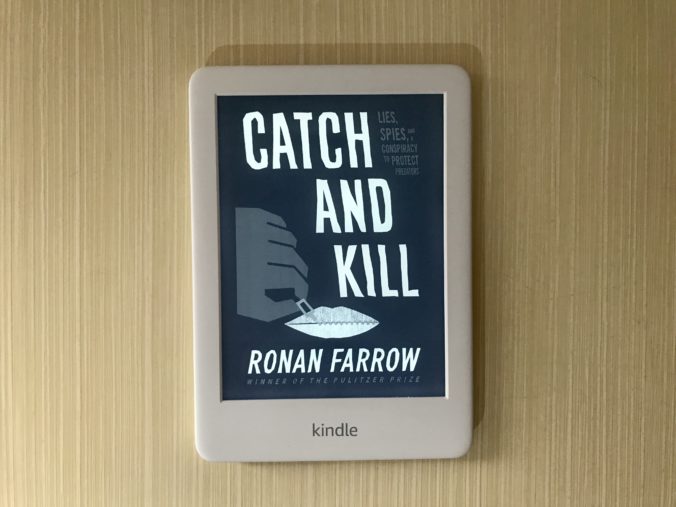[SCROLL DOWN FOR THE ENGLISH VERSION]
Operação Abafa (Editora Todavia, 450 páginas) é o tipo de jornalismo que gostaríamos de ver mais frequentemente. Neste livro, o jornalista investigativo e vencedor do Prêmio Pulitzer, Ronan Farrow, expõe as mentiras, conspirações e jogos de poder que permitiram manter enterrado por tanto tempo um dos maiores escândalos da indústria do entretenimento.
Enquanto apurava o caso Weinstein (Harvey Weinstein é o poderoso produtor de Hollywood acusado de abuso e ataque sexual de mulheres por décadas), Farrow esbarrou em um história ainda maior, que revelou uma prática comum: certos veículos da mídia, agindo em nome de figuras eminentes, costumavam apurar escândalos apenas para comprar os direitos das histórias por meio de acordos de confidencialidade com as fontes e, então, enterrar essas reportagens, impedindo que se tornassem públicas.
À medida que Farrow entrava em contato com as fontes e conseguia que elas dessem seu depoimento em frente à câmera, ele se vê envolvido em uma trama repleta de conspirações que visavam acabar com qualquer tentativa de divulgar a história. Espiões, detetives particulares, dinheiro, mentiras, chantagens… Ironicamente, era como ver a vida real imitando Hollywood:
“Mais uma coisa”, ele disse, depois que agradeci pelo seu tempo. “Tome cuidado. Esse cara, as pessoas que o protegem. Eles têm muito a perder”. “Estou sendo cuidadoso”. “Você não está me entendendo. Esteja preparado para o caso de… Estou dizendo, consiga uma arma”. Eu ri. Ele não.
Por meio de uma narrativa eletrizante, Farrow não apenas revela um escândalo, mas também guia o leitor por uma verdadeira aula de Jornalismo com J maiúsculo. Ele dá inúmeros exemplos de como um repórter deve defender uma pauta, como lidar com as fontes, especialmente em um caso envolvendo denúncias, e como conduzir o processo de checagem dos fatos e assumir a responsabilidade sobre o que é publicado:
Eu insisti com Foley-Mendelssohn e então com Remnick. Ele era bastante competitivo, mas as prioridades da revista eram precisão e cautela. “Nós não vamos correr para sair na frente de ninguém,” Remnick me disse. A reportagem estaria pronta quando estivesse, depois de um intenso processo de checagem dos fatos. “Nós somos um transatlântico, não uma lancha. Sempre soubemos que o Times nos furaria.”
Outro ponto interessante sobre a narrativa de Farrow é como ele lida com a cronologia da história. Ele cria uma espécie de quebra-cabeça feito a partir de diversas perspectivas: de um lado, jornalistas e fontes se esforçando para publicar a história, e do outro lado, o grupo interessado em matar a reportagem de uma vez por todas. Em um estilo suspense, esse quebra-cabeça é resolvido conforme a história avança, expondo uma trama digna de Hollywood.
Operação Abafa é uma leitura obrigatória especialmente em tempos de fake news e cruzadas políticas contra o jornalismo no mundo todo. Enquanto poder e dinheiro silenciam minorias, o Jornalismo pode ser a única instituição a ficar do lado dessas vozes corajosas que decidem falar.
No final, a coragem das mulheres não pode ser extinta. E histórias – as grandes, as verdadeiras – podem ser pegas, mas nunca mortas.
[ENGLISH VERSION]
Catch and Kill is the kind of journalism we would like to see more often. In this book, the Pulitzer winner investigative journalist Ronan Farrow exposes the lies, conspiracies and power games that enabled one of the biggest scandals in the entertainment industry to be buried for so long.
While reporting the Weinstein’s case (Harvey Weinstein is the powerful Hollywood producer accused of sexually abusing and assaulting women for decades), Farrow came across an even bigger story that revealed a pattern: certain media outlets, acting on behalf of prominent people, use to report on explosive stories just to buy its rights through Non-Disclosure Agreements and ultimately bury it.
As he reaches out to sources and get them on camera speaking up, Farrow finds himself in the middle of a conspiracy plot meant to undermine any tentative of unfolding the scandal. Spies, private detectives, lies, money, blackmail… Ironically, it is like having real-world trying to imitate Hollywood:
“One more thing,” he said, after I thanked him for his time. “Watch your back. This guy, the people protecting him. They’ve got a lot at stake.” “I’m being careful.” “You don’t understand. I’m saying be ready, in case. I’m saying get a gun.” I laughed. He didn’t.
Through a thrilling narrative, Farrow not only breaks a scandalous story but also gets to run the reader through a kind of “Journalism with capital J” class. He gives innumerous examples on how a reporter is supposed to stand for a story, how to successfully handle sources, especially in a whistleblower situation like that, and how to do fact-checking and take responsibility of what is published:
I badgered Foley-Mendelssohn and then Remnick. He was fiercely competitive, but the magazine’s priorities were accuracy and caution. “We’re not going to race to beat anyone,” Remnick told me. The story would be ready when it was ready, after an intensive fact-checking process. “We’re an ocean liner, not a speedboat. We always knew that the Times might scoop us.”
Another interesting point about Farrow’s narrative is how he deals with the story timeline. He creates a kind of puzzle made of several perspectives: on one side, journalists and sources who are striving to break the story, and on the other side, the group interested in killing the story once and for all. In a suspense mood, that puzzle is solved as the story plays out, revealing a Hollywood-worthy plot.
Catch and Kill is a must-read especially in times of fake news and this political crusade against journalism throughout the world. As power and money silence minorities, Journalism might be the only institution to side with these brave voices who dare to speak up.
In the end, the courage of women can’t be stamped out. And stories — the big ones, the true ones — can be caught but never killed.
Mariane Domingos
Últimos posts por Mariane Domingos (exibir todos)
- [Resenha / Review] A Vida Pela Frente / The Life Before Us - 14 de março de 2021
- [Resenha / Review] The Vanishing Half - 15 de fevereiro de 2021
- [Resenha / Review] Garota, Mulher, Outras / Girl, Woman, Other - 4 de janeiro de 2021


![[English ⬇️] “Estes são, acima de tudo, ensaios pessoais: pequenos por definição, curtos por necessidade”. “Intimations” é uma coletânea de ensaios de Zadie Smith escrita durante os primeiros meses de isolamento. Nem preciso dizer que essa leitura é extremamente reflexiva e tocante, certo? Tenho certeza – assim como Smith também tem, segundo o que ela mesma esclarece no prefácio – que ainda há muito a ser escrito sobre esta crise sem precedentes para nossa geração. Mas isso não muda o fato de que vale muito a pena ler este livro, especialmente se você não quer esperar mais para dar ao menos um pouco de sentido ao caos. Embora este livro não pretenda explicar nada, ele acaba fazendo isso porque Smith é incrivelmente habilidosa com as palavras. Ela consegue nomear os sentimentos que dominaram o mundo desde o ano passado, apenas observando atentamente o que a cerca e colocando suas impressões em palavras. Da tendência do bolo de banana à consciência do privilégio de classe e a reflexões sobre o assassinato de George Floyd, Smith apresenta histórias curtas com as quais você certamente se identificará, já que todos nós temos vivenciado essa terrível experiência da pandemia.](http://www.achadoselidos.com.br/wp-content/plugins/instagram-feed/img/placeholder.png)
Deixe uma resposta